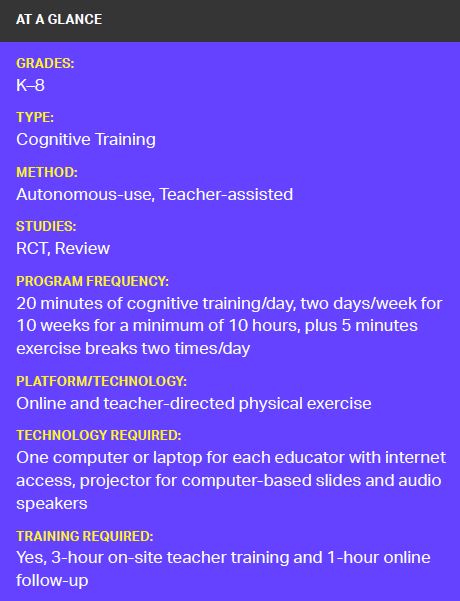 The ACTIVATE™ program was developed by Professor Bruce Wexler, MD in research at Yale University and is distributed by C8 Sciences. It integrates computer-presented cognitive training exercises and specially designed physical exercises (that have built-in cognitive demands) to improve executive function—together developing attention, working memory, self-regulation, cognitive flexibility, pattern recognition, use of categories, and processing speed. Published peer-reviewed scientific papers show that ACTIVATE™ improves executive function and increases percentages of children meeting proficiency in math and reading. While useful with all types of students, high-need schools and students show the largest increases in math and reading proficiency. ACTIVATE™ is applicable to K-8 students, including typically developing as well as students with ADHD or learning disabilities because the six software-based training exercises disguised to look like computer games automatically monitor performance and adjust to provide individualized “lesson plans” for each student.
The ACTIVATE™ program was developed by Professor Bruce Wexler, MD in research at Yale University and is distributed by C8 Sciences. It integrates computer-presented cognitive training exercises and specially designed physical exercises (that have built-in cognitive demands) to improve executive function—together developing attention, working memory, self-regulation, cognitive flexibility, pattern recognition, use of categories, and processing speed. Published peer-reviewed scientific papers show that ACTIVATE™ improves executive function and increases percentages of children meeting proficiency in math and reading. While useful with all types of students, high-need schools and students show the largest increases in math and reading proficiency. ACTIVATE™ is applicable to K-8 students, including typically developing as well as students with ADHD or learning disabilities because the six software-based training exercises disguised to look like computer games automatically monitor performance and adjust to provide individualized “lesson plans” for each student.
ACTIVATE™ physical exercises are specially designed to improve EF skills. They train the same neurocognitive systems as do the computer exercises, but in the context of whole-body movement and social interaction. The physical exercises have the general value of getting up and moving around, and generating and releasing energy, but at the same time also improve EF skills. They are designed to be done in the classroom for 3-5 minutes at different times during the school day or at home with a parent.
Pre-, mid-, and post-assessments provide reports on each student’s areas of relative cognitive strength and weakness to support individual design learning and offer real-time cognitive improvement measures. Assessments compare scores to national, grade-specific cohorts of thousands of students. Assessments include the Flanker test of attention and the List-Sort Working Memory tests based on the NIH Toolbox, and self-control and risk-taking tests widely used in cognitive research and clinical evaluations. Additionally, self-report surveys inform educators about students’ personal feelings about school, cognitive training, and their own abilities to learn.
The online portal allows teachers and administrators continuous monitoring of implementation fidelity and training progress, access to cognitive assessments, links to coaching tips, resources relevant to identified weaknesses in executive function, and FAQs. Teachers can only see their students’ data, and principals can see summative data for the school as well as data for each class and student. District leadership sees summative reports of district use and results, as well as school, class, and individual student data.
C8 Sciences introduced its first product in 2010 and soon after received the National Institutes of Health Transformative Research Award for high innovation, high impact, paradigm-changing medical research. In the past five years alone, ACTIVATE™ has been implemented in more than 1,200 schools across the nation.
OVERVIEW: https://www.c8sciences.com/
RESEARCH: https://www.c8sciences.com/science/
KEY STUDIES SUMMARY:
A randomized control trial of 583 second graders (211 in control group) who participated in the program’s Cognitive Software three to four times a week, and in the physical exercise 1 to 2 times a week, showed improvements in both math and reading on standardized tests that outpaced 1:1 tutoring. Typical teacher-student ratios for implementation were 1:20. (Wexler, B., Iseli, M., Leon, S., Zaggle, W., Rush, C., & Goodman, A. et al. (2016). Cognitive priming and cognitive training: Immediate and far transfer to academic skills in children. Scientific Reports, 6(1). doi: 10.1038/srep32859.) https://www.nature.com/articles/srep32859)
Another report with varying sample sizes of at least 366 students across grades K-8 who participated in EF training in 20- to 30-minute sessions, 1 to 4 times per week for 2 to 6 months showed significant improvement in working memory, a measure of EF, compared to baseline. (Kavanaugh, B., Tuncer, O., & Wexler, B. (2018). Measuring and improving executive functioning in the classroom. Journal of Cognitive Enhancement. doi: 10.1007/ s41465-018-0095-y.) https://www.researchgate.net/publication/327951039_Measuring_and_Improving_ Executive_Functioning_in_the_Classroom
OTHER RESEARCH AVAILABLE:
Wexler, B. E. (2013). Integrated brain and body exercises for ADHD and related problems with attention and executive function. International Journal of Gaming and Computer-Mediated Simulations, 5(3), 10-26. doi:10.4018/jgcms.2013070102 (6 Case Studies within this paper) https://www.igi-global.com/article/integrated-brain-and-body-exercises-for-adhd-and-related-problems-with-attention-and-executive-function/93026
Case Studies: https://www.c8sciences.com/category/case-studies/
Imal, A. & Wexler, B. (2018) Increasing readiness to learn: Benefits of executive function training in kindergarten carry over to first grade. Creative Education, 9, 2662-2676. doi: 10.4236/ce.2018.916201. https://www.scirp.org/Journal/PaperInformation. aspxPaperID=89014